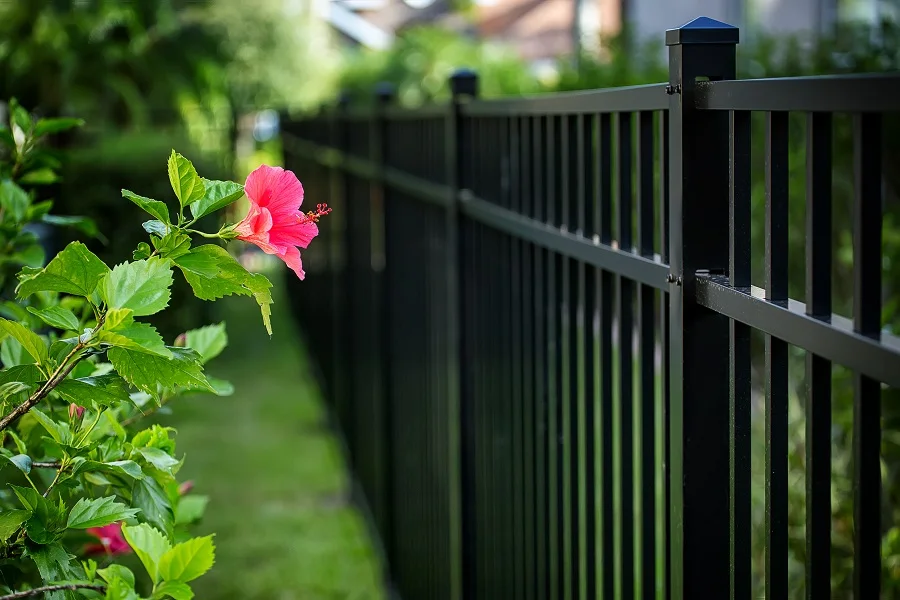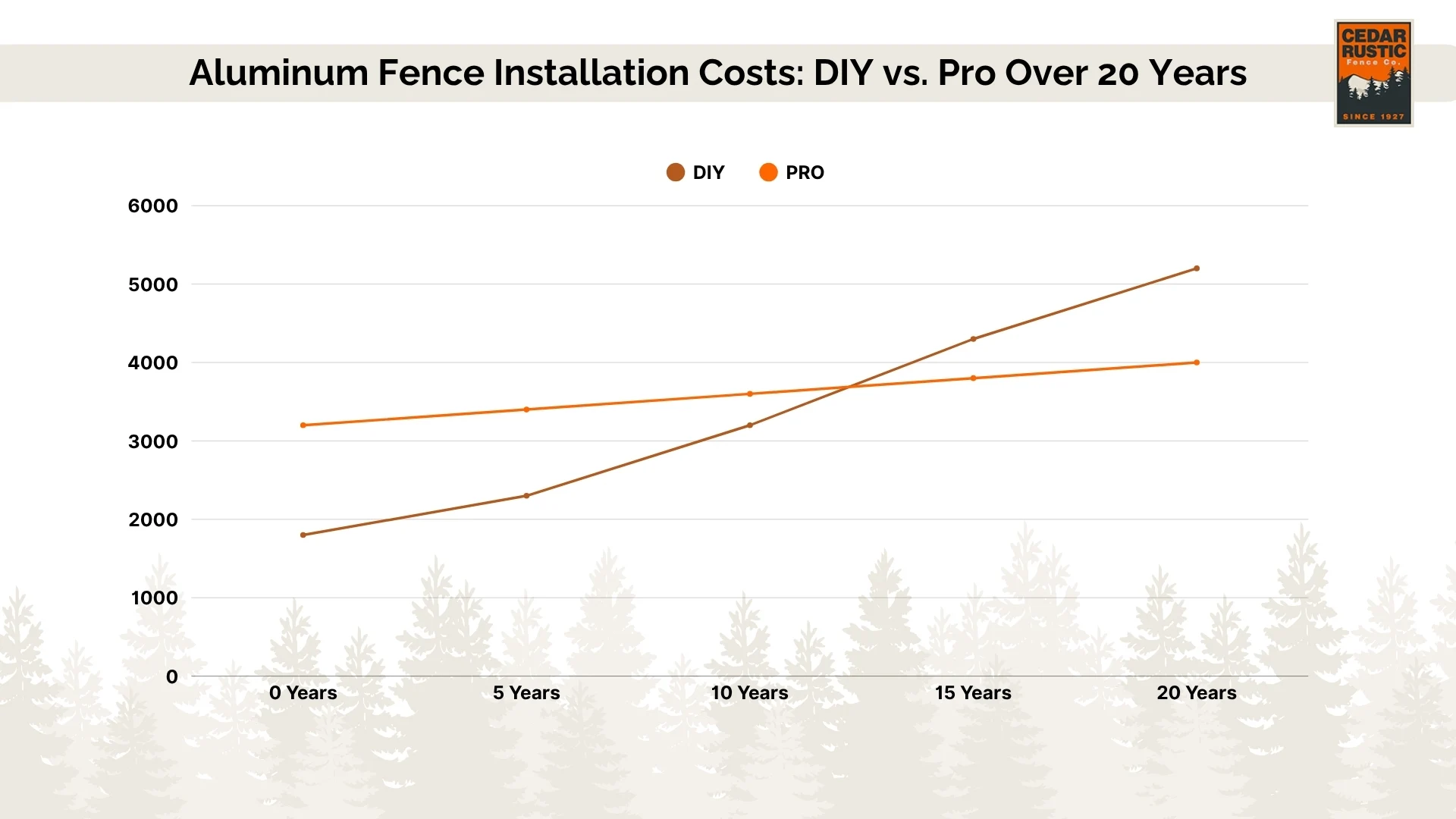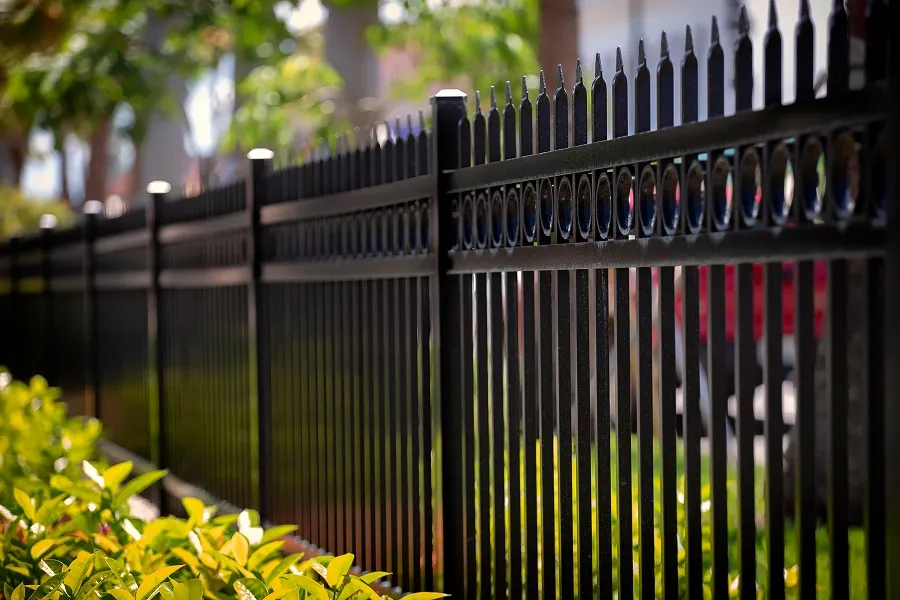An aluminum fence is a durable, rust-resistant fencing option that combines the classic elegance of wrought iron with modern engineering. Unlike traditional iron fences that need constant maintenance to prevent rust, aluminum naturally resists corrosion while providing the same sophisticated appearance at a fraction of the weight.
Cedar Rustic Fence Co. has been manufacturing and installing aluminum fences across Chicagoland and Northwest Indiana since 1927, giving us unique insights into what makes these fences an increasingly popular choice for homeowners who want both security and curb appeal.
Aluminum vs. Other Fence Materials: Making the Right Choice
When selecting the ideal fence for your property, you must understand how aluminum compares to other popular materials. Each option offers distinct advantages, but aluminum's unique combination of durability, aesthetics, and minimal maintenance makes it increasingly attractive to homeowners who want long-term value without sacrificing style.
Quick Comparison Table
Key Advantages of Aluminum Fencing
1. Naturally Rust-Free Performance
Unlike steel or wrought iron fences that require regular painting to prevent rust, aluminum's natural properties make it immune to rust formation. According to the Aluminum Association, aluminum forms a protective oxide coating that prevents corrosion, so it’s ideal for Illinois' varying weather conditions.
2. Exceptional Durability with Minimal Upkeep
Industry data shows that approximately 75 percent of all aluminum ever produced remains in use today, a stat showcasing its remarkable longevity. Unlike wood that requires periodic staining or vinyl that can crack in extreme temperatures, aluminum maintains its appearance with just occasional cleaning.
3. Versatile Design Options
Cedar Rustic offers four distinct aluminum fence styles to match any property:
- Covington: Classic picket design with decorative finials.
- Wellington: Elegant curved pickets for enhanced sophistication.
- Brookshire: Contemporary flat-top design.
- Carolina: Traditional styling with spear-point pickets.
Each style comes in three grades (residential, commercial, and industrial) and multiple colors, including black, bronze, and white.
4. Enhanced Security Features
Security is essential to fencing. Our aluminum fences at Cedar Rustic can be customized with various security enhancements. Choose from standard spacing, tight spacing for added security, puppy pickets to contain small pets, or extra pickets for maximum protection. Self-closing gates meet pool safety codes, while heights ranging from 3 to 8 feet accommodate different security needs.
Potential Drawbacks to Consider
While aluminum excels in many areas, it's important to consider where it might not be the ideal choice:
- Limited privacy: While aluminum fences excel at defining boundaries and providing security, they don't offer the same privacy as solid wood or vinyl panels. However, this can be addressed with:
- Privacy slats (available in matching colors)
- Strategic landscaping with shrubs or vines
- Combination designs using aluminum posts with privacy panels
- Higher upfront investment: Quality aluminum fencing typically costs more initially than basic chain link or some wood options. However, the minimal maintenance requirements often result in lower total ownership costs over 20-30 years.
Real Cost Breakdown: What to Expect in Chicagoland

Based on our 97 years of experience and current market data, here's what homeowners typically invest in aluminum fencing:
Residential-Grade Projects
- Material cost: $15-$25 per linear foot
- Professional installation: $10-$15 per linear foot
- 100-foot fence total: $2,500-$4,000
Commercial-Grade Projects
- Material cost: $20-$35 per linear foot
- Professional installation: $15-$20 per linear foot
- 200-foot fence total: $7,000-$11,000
Additional Costs to Consider
- Permits: $50-$200 (varies by municipality)
- Gate hardware: $150-$500 per gate
- Removal of existing fence: $3-$5 per linear foot
DIY or Pro? The Installation Decision That Impacts Your Investment.

Material costs are only one piece of the puzzle. The installation method you choose significantly impacts both the immediate cost and long-term performance of your aluminum fence. While aluminum's pre-assembled panels make it more DIY-friendly than other materials, there are important factors to consider.
DIY Installation Considerations
Aluminum fencing's lightweight design and pre-assembled sections make it possible for experienced DIYers to tackle installation. The process typically involves:
- Setting posts in concrete with precise spacing and alignment
- Ensuring proper grade transitions on sloped properties
- Attaching panels according to the manufacturer's specifications
- Installing gates with proper hardware and adjustments
However, a successful DIY installation requires more than just following instructions. Here are the essential considerations:
- Specialized tools needed: Post hole digger, 4-foot level, string line, concrete mixer, and various hand tools.
- Technical challenges: Maintaining consistent height on slopes, achieving perfectly plumb posts, ensuring smooth gate operation.
- Hidden complexities: Property line verification, utility location marking, local building code compliance.
- Financial risks: Potential savings of $10-$25 per linear foot in labor, but mistakes can void warranties and require costly corrections.
The Professional Advantage: Why Most Homeowners Choose Experts
DIY can be tempting, but it isn’t always the right choice. Professional installation by certified contractors like Cedar Rustic ensures your fence meets all local regulations and manufacturer specifications. Key benefits include:
- Local expertise: Decades of experience with Chicagoland's clay-heavy soil and high water table areas.
- Permit navigation: Complete handling of municipal requirements and HOA approvals.
- Warranty protection: Manufacturer warranties stay intact with professional installation.
- Quality guarantee: Work backed by contractor warranties and insurance.
- Time savings: A typical residential installation is completed in 1-2 days.
The American Fence Association, representing over 1,400 companies, provides certification programs that ensure installers meet industry standards. When choosing a professional installer, look for AFA certification as a mark of quality and expertise.
Making Your Decision: Is Aluminum Right for You?

Determining whether aluminum fencing is right for your needs requires balancing multiple factors against your specific situation and priorities. Consider how aluminum aligns with your immediate needs and long-term property goals.
Choose Aluminum When You Want:
A "Set It and Forget It" Solution
If you're seeking minimal maintenance with decades of performance, aluminum's corrosion resistance and durable powder coating deliver exactly that. Unlike wood, which demands regular staining or iron requiring rust prevention, aluminum needs only occasional washing.
Sophisticated Curb Appeal That Pays Off
With styles ranging from ornamental Victorian designs to sleek modern profiles, aluminum fencing adds immediate visual impact. Market data confirms that quality fencing increases property values significantly, making aluminum both a functional and a financial asset.
Pool Safety Without Compromise
Aluminum's strength, self-closing gate compatibility, and ability to meet strict pool codes make it the preferred choice for pool enclosures. Many insurance companies even offer premium reductions for properly installed pool safety fencing.
Environmental Responsibility
With 75 percent recyclability and reduced manufacturing emissions, aluminum supports green living without sacrificing performance or aesthetics.
Look Elsewhere When You Need:
Complete Visual Privacy
While aluminum defines boundaries beautifully, it won't block views like solid vinyl or wood panels. If seclusion is paramount, consider cedar or vinyl alternatives, though you'll sacrifice aluminum's low maintenance benefits.
Rock-Bottom Initial Pricing
Basic chain link costs significantly less upfront, but it’s a choice lacking aluminum's aesthetic appeal and longevity. Remember total ownership costs, as aluminum's minimal maintenance often proves more economical over 20-30 years.
Unlimited Custom Design Options
While aluminum offers various styles, wood provides infinite customization for truly unique designs. However, this flexibility comes with more maintenance requirements.












